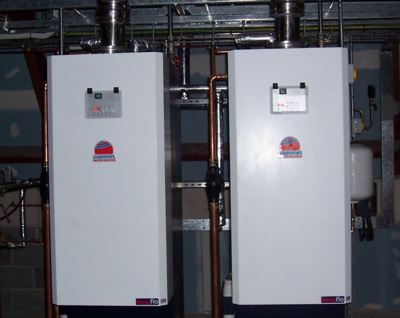Giving legionella nowhere to hide

Paul Hardy discusses the control of legionella in DHW systems, including those supported by renewable-energy sources.
Protecting occupants against the legionella bacteria that could exist in HVAC stored water systems is an obligation of owners and managers of commercial buildings. Clear principles must be applied in the design, function and maintenance of all man-made water systems to ensure that these bacteria cannot be supported, as in sufficient numbers they can cause fatal disease for some humans.
Consequently, products and systems developed by manufacturers of HVAC equipment meet legislative requirements in respect of conventional technology, with the process continuing with regard to renewable and low carbon technologies.
This article focuses on hot-water services in high-occupancy indoor environments, where hot water is provided in increasingly higher volumes for hand washing, surface cleansing and general hygiene, all importantly protecting against the spread of germs and infections, such as flu viruses. The present trend is that hot-water demand in buildings outstrips space-heating demand.
Consequently, system designers generally consider it more efficient to separate the two loads, where possible devolving hot-water production closer to the point of use using direct-fired water heaters. This prevents heat loss from long pipe runs and standing losses from the thermal store, whilst allowing the main boiler to be shut down over the Summer when there is no demand for space heating, significantly reducing energy consumption.
Perhaps ironically, the hot water that is so effective in preventing the spread of germs and infection can without protective measures give rise to the risk of lurking bacterial contamination. Legionella bacteria are adept at colonising man-made water systems where there is stagnation, accumulation of debris, scale and corrosion, or in lukewarm water between 20 and 45°C.
Research shows that legionella bacteria are killed in seconds at 70°C, with over 90% being killed after two minutes at 60°C, whilst it would take two hours to achieve the same level of elimination at 50°C. As well as the temperature factor, another consideration is the time taken for normal use of water to completely replace the volume of water held in the storage vessel.
The fast recovery rate of direct-fired water heaters ensures the water stored is always maintained at 60°C or above. While this eliminates the survival of any bacteria within the unit, the position of the hot-water outlet in relation to the cold-water inlet ensures sufficient turbulence to prevent stratification occurring. The latest stainless steel tanks are scale resistant, whilst magnesium anodes fitted to glass-lined tanks combat the build-up of lime deposits and debris in. The ‘number-one’ commercial water heater supplier in the UK has a range of products independently accredited as ‘legionella resistant’, giving customers absolute peace of mind as well as being fully compliant with all legislative requirements and HSE codes of practice.
Low-carbon solutions
When considering low-carbon solutions for producing domestic hot water, such as integrated solar thermal and air-to-water heat-pump systems, there are two important questions end users and specifiers should consider.

• Has the equipment/system been designed to allow effective pasteurisation and disinfection of legionella bacteria?
• Does the strategy for operating the anti-legionella cycle ensure that the most energy-efficient method is employed so as not to negate the carbon-reduction benefit of the low-carbon technology employed?
There will be periods when the water in the indirect pre-heat cylinder may not achieve the minimum temperature for pasteurisation which, without appropriate risk management, may lead to legionella bacteria development and growth. With no secondary source of heat generation within the pre-heat cylinder, the water within a storage water heater being sustained at typically 60 to 65°C offers an energy source for pasteurising the water stored in the pre-heat cylinder.
Water at 60 to 65°C is passed between the hot outlet of the storage water heater and the cold inlet of the pre-heat cylinder by a shunt pump, causing pasteurisation as it rises through the pre-heat cylinder, from the lowest possible part, destratifying the water. The water in the pre-heat cylinder must be maintained at this temperature for a least an hour for effective pasteurisation, ideally once a day.
Specific requirements for mitigating the risk of the development of legionella bacteria are detailed in the HSE Code of Practice and Guidance L8 ‘The control of legionella bacteria in water systems’, without stating categorically how frequently the anti-legionella cycle has to be operated. We would suggest pasteurising at least once a week, lasting for at least one hour, to ensure disinfection.
However, the end user must decide what anti-legionella operational strategy should be adopted, depending on the risk of the development of the bacteria and the property/application in question. What must not be overlooked is that the frequency of the cycle, and the time of day pasteurisation occurs, has a significant effect on the energy savings achieved by either system.
Paul Hardy is managing director of Baxi Commercial Division.







